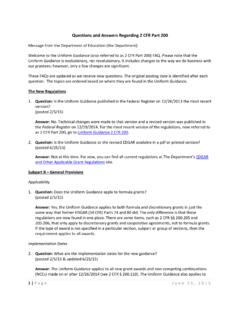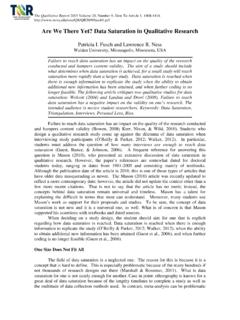Transcription of Active Listening Strategies of Academically Successful ...
1 Eurasian Journal of Educational Research, issue 60, 2015 ,163-180 Active Listening Strategies of Academically Successful university students Murat CANPOLAT1 Sekvan KUZU2 Bilal YILDIRIM3 Sevilay CANPOLAT4 Suggested Citation: Canpolat, M., Kuzu, S., Y ld r m, B.,& Canpolat, S. ( 2015 ). Active Listening Strategies of Academically Successful university students . Eurasian Journal of Educational Research, 60,163-180 Doi: Abstract Problem Statement: In formal educational environments, the quality of student Listening affects learning considerably. students who are uninterested in a lesson listen reluctantly, wanting time to pass quickly and the class to end as soon as possible. In such situations, students become passive and, though appearing to be Listening , will not use Listening Strategies that promote productive and permanent learning. By contrast, when students willingly participate in lessons by Listening to instructors, asking questions, and holding discussions, they practice Active Listening that allows them to achieve more productive and more permanent learning.
2 Purpose of Study: The aim of this study was to identify Active Listening skills that Academically Successful university students use in classes and to analyze these students opinions on Active Listening skills. Methods: This qualitative research involved a case study by which Academically Successful university students were observed in a classroom environment and their thoughts on Active Listening skills examined. 1 Lecturer, Mustafa Kemal university , Faculty of Education, Department of Educational Sciences, 2 Lecturer, Mustafa Kemal university , Faculty of Education, Department of Educational Sciences, 3 Research Assistant, Mustafa Kemal university , Faculty of Education, Department of Primary Education, 4 Teacher, Ministry of Education, 164 Murat Canpolat, Sekvan Kuzu, Bilal Y ld r m & Sevilay Canpolat According to the model, participants were evaluated without any intervention by researchers in the classroom environment.
3 Findings: Findings from observations and interviews were organized under three subheadings: cognitive, affective, and psychomotor-based Strategies . Cognitive Strategies included paying attention, taking notes, making associations and analogies, asking questions, integrating information, making inferences, getting the main idea, and setting an objective; affective Strategies included attending class on time, being motivated, staying calm, and enjoying the lesson; and psychomotor-based Strategies included being close to the board, following along with both the head and eyes, making eye contact, generating feedback, sitting up straight, and paying attention to gestures, facial expressions, tone of voice, and stresses in speech. Conclusion and Recommendations: According to data collected during the study, Academically Successful university students used different cognitive, affective, and psychomotor-based Strategies in practicing Active Listening .
4 Keywords: Active Listening , university students , academic success, Listening strategy Introduction The skill of Listening is the first linguistic skill that humans acquire. In fact, fetuses hear voices outside the womb as early as the fifth month of gestation (Do an, 2008). Perhaps given its primary placement among linguistic skills, the many definitions of Listening differ. In general, however, Listening comprises sending a message ( , transmission), hearing that message, and making sense of it ( zbay, 2005). Listening does not mean watching the other party passively, but making an effort to receive and interpret messages in order to fully achieve communication (Devito, 1995; Omololu, 1984; Umagan, 2007). Able to become both individuals and social actors by using linguistic skills, humans hear, perceive, recognize, meet others, think, and understand by Listening . As the most important means of learning in every period of human development and growth, Listening has been acknowledged as fundamental among linguistic skills (Karad z, 2010).
5 By extension, since individuals make sense of all kinds of sounds that they hear throughout life and store them in their memory as an important part of their accumulated experiences and knowledge, Listening is also fundamental in learning. Listening s role in all of an individual s experiences with learning his or her native language expands over time. On average, approximately half of all human activities involve Listening and 45% of time used for communication involves Listening , as shown by research conducted by Lyman Steal at the university of Minnesota (Y ld z, Okur, Ar , &Y lmaz, 2003). Furthermore, by Listening to others, people meet many of their Eurasian Journal of Educational Research 165 cognitive, affective, and social requirements such as learning, obtaining proper nutrition, communicating, speaking, and showing emotion. At the same time, a great deal of both formal and informal learning is achieved by Listening , and according to Hunsaker (1990), 80% of what people know is obtained by Listening .
6 Given the abundance of teachers who use lecture-based teaching methods in schools, the time that students spend Listening increases all the more. For some students , nearly 83% of what they learn is learned by Listening ( zbay, 2005; Petress, 1999). In effect, the above figures underscore the importance of Listening training both at school and at home. The acts of Listening that an individual performs to meet cognitive, affective, and social requirements throughout the processes of formal and informal education are multidimensional. Listening is an activity that individuals engage in cognitive, affective, and psychomotor-based ways and, defined as a linguistic skill, should be carried out strategically and sophisticatedly in any mode of communication. In Listening , individuals are not passive receivers who remain silent and submissive while information is communicated, but Active receivers who present their thoughts and emotions in ways both verbal and nonverbal.
7 Listening means understanding thoughts expressed in speech, organizing and evaluating them, determining their interrelationships, and selecting ones worth remembering (Ergin & Birol, 2005). In formal educational environments, the quality of student Listening affects learning considerably. students who are uninterested in a lesson listen reluctantly, wanting time to pass quickly and the class to end as soon as possible. In such situations, students become passive and, though appearing to be Listening , will not use Listening Strategies that promote productive and permanent learning. By contrast, when students willingly participate in lessons by Listening to instructors, asking questions, and holding discussions, they practice Active Listening that allows them to achieve more productive and more permanent learning. In classroom environments, the ideal form of Listening is Active Listening .
8 Unlike passive listeners who seek solely to retain ideas in their minds, Active listeners both produce thoughts and share those thoughts by expressing them in verbal and nonverbal ways. The observable external signs of Active Listening include physically displaying emotion, cooperating with members of the group of listeners, physically expressing approval or disapproval of what is said, exhibiting behaviors directed toward Listening , asking questions about what is being said, and contributing appropriate explanations and comments (Brent &Anderson, 1993; see also Akyol, 2012). As part of their learning experiences throughout the processes of education, each individual develops Listening Strategies that are cognitive, psychomotor-based, or affective in nature. While implementing cognitive Listening Strategies , individuals compare and classify information in their minds, make inferences, formulize what they have learned, generate associations, reason, take notes, and make generalizations (Akyol, 2006), all for the purpose of achieving more effective and permanent learning.
9 At the same time, Listening Strategies that reflect listener emotions expressed via body 166 Murat Canpolat, Sekvan Kuzu, Bilal Y ld r m & Sevilay Canpolat language while Listening , including facial expressions, gestures, and sitting position, significantly demonstrate how listeners feel in the environment and what stance they take on what is said. By turns, listeners sympathize, empathize, and may even feel excited, scared, or stressed. Since all of these states influence an individual s Listening reflexes and habits, their effective and strategic use of these actions can help to more fully realize communication, learning, thinking, hearing, and telling. Furthermore, stating that auxiliary Strategies need to be used to facilitate understanding, Akyol (2006) has posited that Active listeners make guesses prior to Listening and continuously renew their guesses while Listening according to new information and clues provided by the speaker.
10 Another general strategy is determining the main idea, in which listeners regularly ask themselves what the point of the information provided is. In the light of the above, we hypothesized that the development of Listening skills among university students contributes to their academic success and improves their social skills. To test our hypothesis, we identified Strategies used by Academically Successful university students by examining what kind of listeners they were in a classroom environment, as well as analyzed these students opinions on Active Listening skills. In effect, the study has sought to contribute to the planning and implementation of practices that can develop students Listening skills. Method Research Design This qualitative research involved a case study by which Academically Successful university students were observed in a classroom environment and their thoughts on Active Listening skills examined.

















